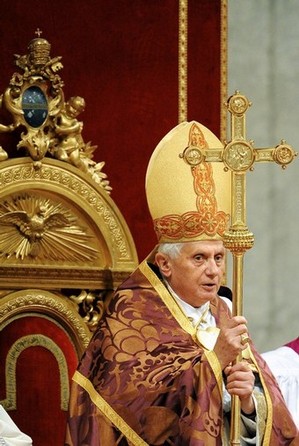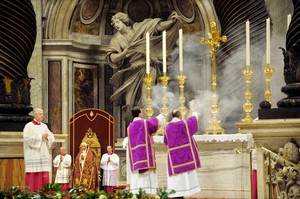Re-enrolling in the Church’s School of Prayer

Today’s Collect
Da, quaesumus, omnipotens Deus,
hanc tuis fidelibus voluntatem,
ut, Christo tuo venienti
iustis operibus occurentes,
eius dexterae sociati,
regnum mereantur possidere caeleste.
Almighty God,
grant to your faithful, we beseech you,
the will to go forth with works of justice
to greet your Christ at His coming,
that they, having a place at His right hand,
may be found worthy of the kingdom of heaven.
Collected Into Unity
Today’s Collect for the First Sunday of Advent in the Ordinary Form — our collective prayer, and the prayer inspired by the Holy Spirit by which all our secret prayers are gathered together and presented to the Father, through the Son — deserves to be repeated until it descends into the heart. Its ultimate function, and that of all liturgical prayer, is to bring us into the unity for which Our Lord prayed on the night before He suffered: unity among ourselves so as to form one single bridal body united to Christ the Bridegroom-Head and, through Him, unity with the Father, in the embrace of the Holy Spirit.
Omnipotens Deus
Almighty God: first of all we address the Father. Our prayer goes straightaway to “the Father of lights from Whom descends every good endowment and every perfect gift” (James 1:17). We call Him Omnipotens Deus, all-powerful or almighty God, thus echoing what the Archangel Gabriel said to the Virgin of Nazareth: “For with God nothing will be impossible” (Luke 1:37). Again, by addressing God as omnipotent, we appropriate the very expression used by the Virgin Mary, already with child, in her Magnificat: “He who is mighty has done great things for me” (Luke 1:49).
Primary School of Catholic Prayer
The liturgy of the Church — and, in particular the Divine Office — is the primary school of Catholic prayer: a school that is in session 365 days a year, a school that, according to the ancient tradition of the Hours, meets seven times a day and once during the night. It is a school of total immersion in a new language: the language of prayer given by the Holy Spirit to the Church. Every year on the First Sunday of Advent we are invited to enroll again in this primary school of Catholic prayer, the liturgy of Mother Church.
Ex Corde Ecclesiae
It is through the liturgy — and again, especially through the Divine Office — that “the Spirit also helpeth our infirmity. For we know not what we should pray for as we ought” (Romans 8:27). Saint Paul says that the Holy Spirit “asketh for us with unspeakable groanings”; the liturgy articulates these groanings of the Spirit. Rising from the heart of the Church, the groanings of the Holy Spirit take form on her lips in antiphons and in psalms, in responsories and in Collects. One who prays in harmony with the Church, making all of her expressions his own, prays in the Holy Spirit (cf. Ephesians 6:18).

Da, quaesumus
Back to the text of our Collect: the second line makes us say, “grant to your faithful, we beseech you, the will to go forth with works of justice to greet your Christ at his coming.”
The Church does not tell God what she wants like someone ordering from his menu in a restaurant, first of all, because she is not paying the bill! The Church uses the humble language of supplication: she entreats, she beseeches, she implores, she begs. The liturgy never allows us to lose sight of our own creatureliness, of our absolute and utter dependence on God, and of the grandeur of His Divine Majesty. And so she says, and she teaches us to say, “grant to your faithful, we beseech you.”
Grace Before All
And what does she pray for on the First Sunday of Advent? “The will to go forth with works of justice to greet your Christ at His coming.” The human will cannot, of itself, move toward God without the grace of God. The prayer does not say, “help us to go forth with works of justice”; it says quite pointedly, “grant to your faithful, we beseech you, the will to go forth with works of justice.” “Apart from me,” says the Lord Jesus, “you can do nothing” (John 15:5), and again, “No one comes to the Father but by me” (John 14:6). We do not ask God for a mere helping hand; we ask him to grant us even the will to get moving.
This is one of the first lessons in the Church’s school of prayer: our utter dependence on God’s merciful favour, on His free gift of grace. God is present before we call upon Him, making it possible for us to call upon Him: “I was ready,” He says in Isaiah 65:1, “to be sought by those who did not ask for me; I was ready to be found by those who did not seek me.”
Works of Justice
Specifically, we pray for the will to go forth with works of justice. What are these works of justice? They are the thoughts, words, and deeds by which God adjusts us to His will: our sanctification. “For this is the will of God,” says Saint Paul, “Your sanctification.” Concretely the works of justice are the seven spiritual and seven corporal works of mercy enumerated in the Catechism. The works of justice correspond also to what Saint Paul, in writing to the Galatians, calls, “the fruit of the Holy Spirit” (Galatians 5:22-23). Again, you would know them from the Catechism: charity, joy, peace, patience, benignity, goodness, longanimity, mildness, faith, modesty, continency, and chastity.
His Threefold Advent
It is with these works — evidence of the work of the Holy Spirit in our lives — that we are to go forth to greet Christ at His coming. His coming — His advent — is threefold.
Historical and Liturgicall
First, there is His historical advent, His descent into the womb of the Virgin, His birth at Bethlehem: this historical event is re-presented, actualized for us in the course of the liturgical year. The liturgy is not a pageant depicting an event locked in an irretrievable past: it is the mysterious inbreaking of that historical event into our here and now by means of sacred signs charged with grace by the Holy Spirit.
Visited by Grace
Then, there are His secret intermediate advents: so often as Our Lord visits a soul by His grace, principally through the Most Holy Eucharist and the other sacraments, but also through the Divine Office, and in lectio divina, we can say, “Behold, the Bridegroom is here!” (Mt 25:6).
At the End of Time
And finally, there will be His advent at the end of time. It is of this advent that today’s Gospel speaks: “But of that day and hour no one knoweth, not the angels of heaven, but the Father alone” (Matthew 24:36).
The final line of today’s Collect is a preview of all that we hope and pray for: “that, having a place at His right hand, they may be found worthy of the kingdom of heaven.” The Father finds this petition irresistible because it corresponds to the prayer of His Son, our Eternal High Priest surrounded by His Apostles in the Upper Room: “Father, I desire that they also, whom Thou hast given Me, may be with Me where I am” (John 17:24). And if this were not enough we have this other word of His, a promise to which we have only to lay claim: “Behold, I stand at the door, and knock. If any man shall hear my voice, and open to me the door, I will come in to him, and will sup with him, and he with me. To him that shall overcome, I will give to sit with me in my throne: as I also have overcome, and am set down with my Father in his throne” (Apocalypse 3:20-1).
What the Spirit Saith to the Churches
There is all of this and more in the Collect by which the Church opens Holy Mass and concludes all the Hours today. “He that hath an ear,” then, “let him hear what the Spirit saith to the churches” (Apocalypse 2:29).
